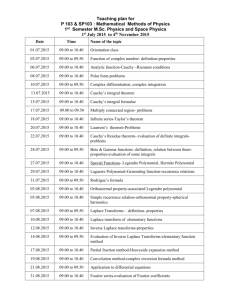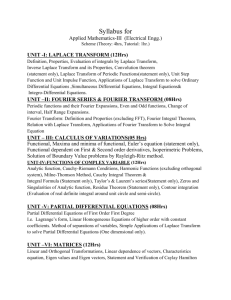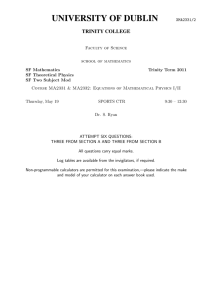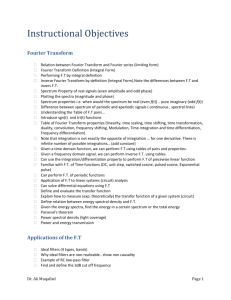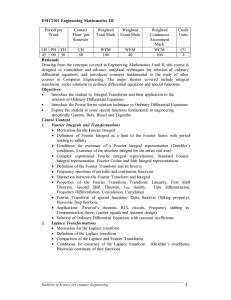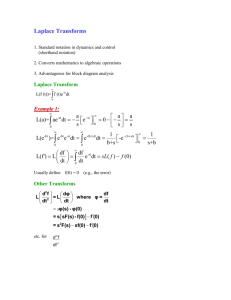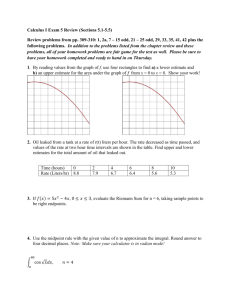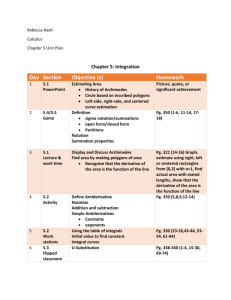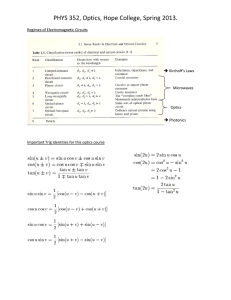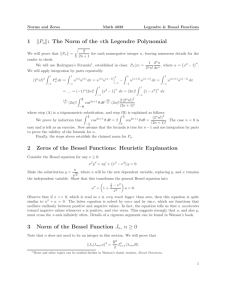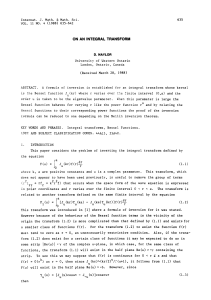pdf file for STUDY GUIDE - Kansas State University
advertisement
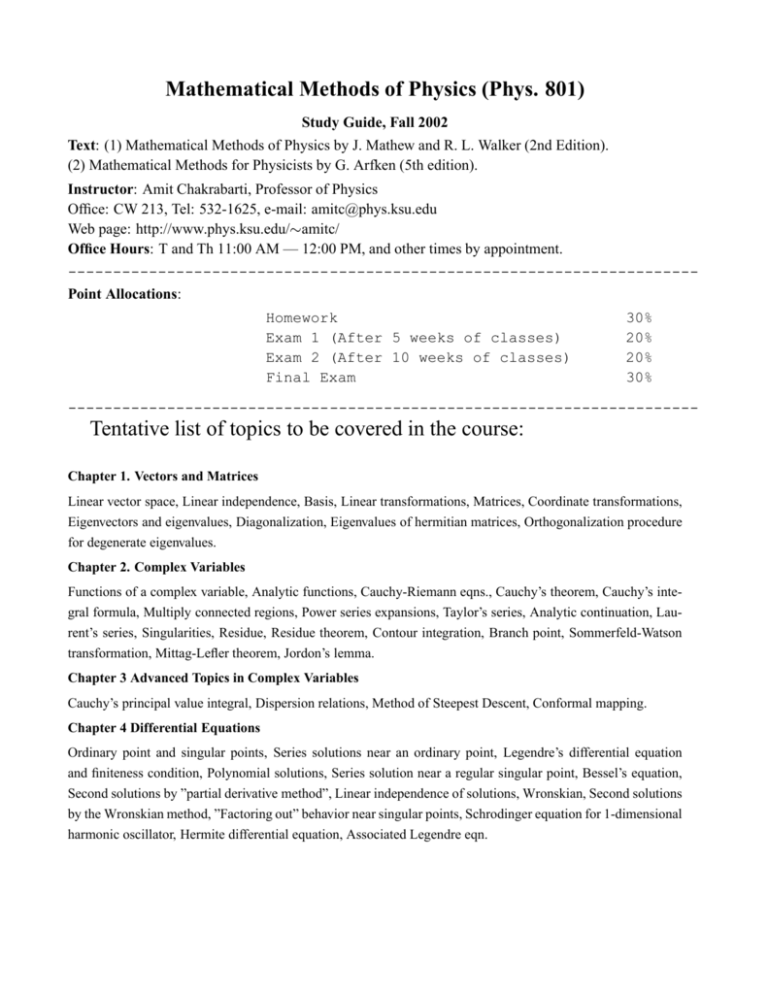
Mathematical Methods of Physics (Phys. 801) Study Guide, Fall 2002 Text: (1) Mathematical Methods of Physics by J. Mathew and R. L. Walker (2nd Edition). (2) Mathematical Methods for Physicists by G. Arfken (5th edition). Instructor: Amit Chakrabarti, Professor of Physics Office: CW 213, Tel: 532-1625, e-mail: amitc@phys.ksu.edu Web page: http://www.phys.ksu.edu/ amitc/ Office Hours: T and Th 11:00 AM — 12:00 PM, and other times by appointment. ---------------------------------------------------------------------Point Allocations: Homework Exam 1 (After 5 weeks of classes) Exam 2 (After 10 weeks of classes) Final Exam 30% 20% 20% 30% ---------------------------------------------------------------------- Tentative list of topics to be covered in the course: Chapter 1. Vectors and Matrices Linear vector space, Linear independence, Basis, Linear transformations, Matrices, Coordinate transformations, Eigenvectors and eigenvalues, Diagonalization, Eigenvalues of hermitian matrices, Orthogonalization procedure for degenerate eigenvalues. Chapter 2. Complex Variables Functions of a complex variable, Analytic functions, Cauchy-Riemann eqns., Cauchy’s theorem, Cauchy’s integral formula, Multiply connected regions, Power series expansions, Taylor’s series, Analytic continuation, Laurent’s series, Singularities, Residue, Residue theorem, Contour integration, Branch point, Sommerfeld-Watson transformation, Mittag-Lefler theorem, Jordon’s lemma. Chapter 3 Advanced Topics in Complex Variables Cauchy’s principal value integral, Dispersion relations, Method of Steepest Descent, Conformal mapping. Chapter 4 Differential Equations Ordinary point and singular points, Series solutions near an ordinary point, Legendre’s differential equation and finiteness condition, Polynomial solutions, Series solution near a regular singular point, Bessel’s equation, Second solutions by ”partial derivative method”, Linear independence of solutions, Wronskian, Second solutions by the Wronskian method, ”Factoring out” behavior near singular points, Schrodinger equation for 1-dimensional harmonic oscillator, Hermite differential equation, Associated Legendre eqn. Chapter 5 Special Functions Legendre polynomials, Normalization, Rodrigues’ formula, Integral representations, Generating functions for the Legendre polynomials, Orthogonality relations, Bessel functions, Orthogonality properties of Bessel functions, Generating function for Bessel functions, Integral representations, Hankel functions, Asymptotic forms. Chapter 6 Integral Transforms Fourier Series, Even and odd functions, Convergence, Fourier transforms, Delta- Functions, Parseval’s Theorem, Convolution theorem, Laplace transform, Applications of integral transforms: Wave Equation (Fourier Transform), LCR circuit (Laplace Transform), Bessel’s Equation for n=0 (Laplace Transform) Chapter 7 Partial Differential Equations Important PDEs in physics, Separation of variables, Helmholtz equation, Rectangular coordinates, Cylindrical coordinates, Vibration of a round drum-head, Spherical coordinates, Spherical harmonics, Laplace’s eqn. in spherical coordinates, Uniqueness of solutions, Interior and exterior problems, Integral transform methods in PDE, 1 dimensional heat equation with ’radiative’ boundary condition by Laplace transform method, Temperature Distribution in a very long heat conducting rod by Fourier transform Method : Pointing out the “Green’s function” for the problem. Chapter 8 Green’s Functions Sturm-Liouville eigenvalue problem, Boundary value problem as eigenvalue problem, Inhomogeneous problem and Green’s functions, Discussion of different boundary conditions, Examples : Bowed stretched string, Forced drumhead, Wave equation with a source, Retarded potentials. Chapter 9 Calculus of Variations Statement of the problem, Euler-Lagrange eqns., Examples from classical mechanics, Constraints, Variations subject to constraints, Lagrange’s multiplier, Connection between eigenvalue problem and calculus of variations, Rayleigh-Ritz variational method. Chapter 10 Integral Equations Different types of integral eqns., Separable and degenerate kernels, Convolution integral equations, Volterra equations, Iterative methods. ---------------------------------------------------------------------University policy requires that the following be included on this study guide: I. STATEMENTS FOR ACADEMIC ACCOMMODATIONS FOR DISABLED STUDENTS If you have any condition, such as a physical or learning disability, which will make it difficult for you to carry out the work as I have outlined it or which will require academic accommodations, please notify me and contact the Disabled Students Office (Holton 202), in the first two weeks of the course. II. STATEMENT REGARDING ACADEMIC HONESTY Plagiarism and cheating are serious offenses and may be punished by failure on the exam, paper or project; failure in the course; and/or expulsion from the university. For more information refer to the “Academic Dishonesty” policy in K-State Undergraduate Catalog and the Honor System Policy on the Provost’s home page at http://www.ksu.edu/honor/.
